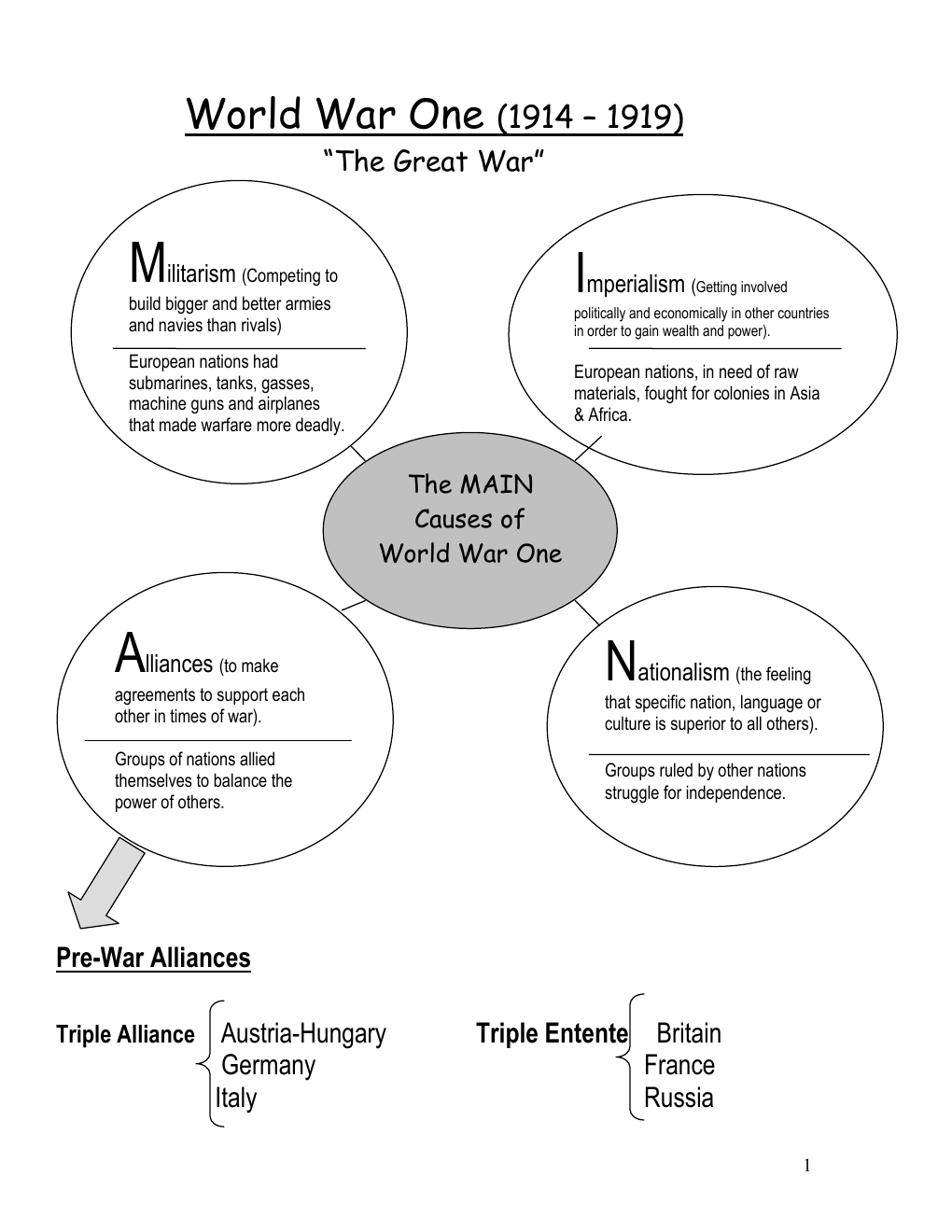World War
Publié le 13/02/2024
Extrait du document
«
World War One
(1914 – 1919)
“The Great War”
Militarism
Imperialism
(Competing to
build bigger and better armies
and navies than rivals)
(Getting involved
politically and economically in other countries
in order to gain wealth and power).
European nations had
submarines, tanks, gasses,
machine guns and airplanes
that made warfare more deadly.
European nations, in need of raw
materials, fought for colonies in Asia
& Africa.
The MAIN
Causes of
World War One
Alliances
(to make
agreements to support each
other in times of war).
Groups of nations allied
themselves to balance the
power of others.
Nationalism
(the feeling
that specific nation, language or
culture is superior to all others).
Groups ruled by other nations
struggle for independence.
Pre-War Alliances
Triple Alliance
Austria-Hungary
Germany
Italy
Triple Entente Britain
France
Russia
1
The Spark that Started the War
The assassination of Archduke
Franz Ferdinand, heir to the throne
of Austria-Hungary, by a Serbian
nationalist.
Why did this start a war? Austria-Hungary declared war on Serbia.
Because of an earlier
alliance, Russia agreed to defend Serbia.
They mobilized (prepared military) for war.
So…
Germany declared war on Russia and France, which led…
Britain to declare war on Germany, which led…
Austria-Hungary to declare war on Russia!
Who’s is on which side now?
Central Powers
Allied Powers
Austria-Hungary
Germany
Britain
France
Russia
Italy**
** Note: Italy switched sides in 1915!
2
The War in Europe
Unlike previous wars, European militarism provided new technologies to help each
side, especially:
Machine Guns
Poisonous Gases
Airplanes
U-Boats (submarines)
They also used new strategies, especially
trench warfare: defending a position by
fighting from the protection of deep ditches.
The area between opposing trenches was
called no-man’s-land.
Much of the fighting
took place here.
3
What should the US do? Stay Neutral or Go To War?
Reasons
for
Neutrality
- Who wants to be at war?!
- Many thought the War dealt with European
matters, not American ones.
- Although most sided with the Allies, many
Americans had immigrated from the nations of
the Central Powers.
- American businesses were making lots of
money off of the war, especially selling
supplies to the Allies.
By the end of 1914, the war had already become a stalemate (neither side could win a
decisive victory)
So how do we get involved?
1) The Sinking of the Lusitania: German U-boat warfare sinks the Lusitania, a
British boat with 128 Americans on board.
Americans become increasingly
upset over German submarines
sinking non-military ships.
2) The Zimmerman Note: German
ambassador to Mexico proposed an
alliance between Germany and
Mexico against the US.
For their
effort, Mexico would receive the
lands of New Mexico, Arizona and
Texas.
Americans found out about
this and become outraged.
On April 6, 1917, we declare war on Germany!
4
The United States at Home during the
Great War
The War Industries Board was created to
oversee the production and distribution of
goods manufactured by the nation’s war
industries (steel, copper, rubber, etc).
The Committee of Public Information was
formed to increase public support for the war
effort.
They attempted to show the importance
of the US being in the War.
Congress passed the Selective Service Act,
which made all males age 21-30 register for a
draft.
Numbers were drawn at random for the
draft.
Liberty Bonds were sold to raise money....
»
↓↓↓ APERÇU DU DOCUMENT ↓↓↓
Liens utiles
- The Sound of Music The Sound of Music, motion picture about a religious young governess who brings music and happiness to a widower's large family, set in Austria during World War II (1939-1945).
- Casablanca (motion picture) Casablanca (motion picture), popular drama about two star-crossed lovers in occupied French Morocco during World War II (1939-1945).
- Holocaust I INTRODUCTION Holocaust, the almost complete destruction of Jews in Europe by Nazi Germany and its collaborators during World War II (1939-1945).
- World War I .
- World War II .

































